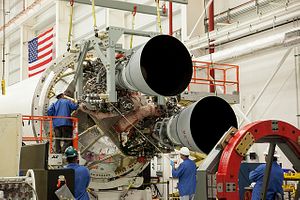Have you been watching? In August, China quietly tested a new intercontinental ballistic missile (ICBM), to which it attached two “simulated” warheads. This missile, alternately called the DF-41 or CSS-X-20, has been tested four times since 2012. Why do we care? Because China’s ability to launch multiple warheads – on one rocket – is a significant technological advancement. And uniquely dangerous: The proliferation of multiple Chinese warheads, or heavy-lift rockets carrying nuclear-tipped “multiple independently-targetable reentry vehicles,” could put us on the fast-track to the past.
What if, hypothetically, China continued to mature this capability and accelerated ICBM testing? What if China decided to upgrade its ICBM launch capacity, or supplement it, with Russian ICBM rocket engines? And what if Russian rocket engines offered China the chance to accelerate ICBM launches, and consequently delivered a “break out” or “leap ahead” ability essential to seizing the high ground – space. The result could be militarily and politically destabilizing – even making all of the en vogue discussion about Chinese anti-access/area-denial capabilities (or A2/AD for short) with advanced missile technology look like yesterday’s news.
And yet that is the course we may be on.
What is worse, unless congressional action quickly reverses China’s access to Russian heavy-lift engines – the very ones America was on course to buy until sanctions kicked in – we may be seeing those Russia rocket engines again, but from a very different perspective as they provide a robust ballistic missile system for a nation not so friendly to U.S. national security interests. And here is the punchline before we get there: Tragedies are more often the result of indecision than of decision.
So, how do the puzzle pieces fit together? In short, China has not only tested this new ICBM with multiple warheads, but has actually begun discussions with Russia to buy heavy-lift rocket engines essential when dealing with throw-weight and range. This news hit the streets a month ago. And the most notable and capable Russian heavy-lift engines are apparently the RD-180 engines that have, for years, been purchased by the United States.
In a stunning irony, America has used these engines to launch satellites into outer orbits, presumably to see things from space … like big rocket engines being tested. These Russian engines, which China may now be seeking to buy, empower our national security twice over – they help us keep eyes in the sky and they prevent others from using them for hostile purposes.
So, what can Congress do to keep our cities and countryside safe? Congress can – and arguably must now – carefully review the list of sanctions we have imposed on Russia. This is one that should stricken from the list, for our sake, not theirs – even if only for strategic security purposes. Just as we have not sanctioned Russian transport of Americans to the space station, we must continue cooperating on the topic of heavy lift rocket engines.
The upside of that congressional action is simple: America maintains access to the orbits it needs – and cannot get to without Russian engines – and assures that, in a moment when China is determined to create an ICBM fleet with nuclear warheads, it will not encourage them to do so with Russian propulsion technology. A single piece of corrective legislation, and Congress will preserve the stability the U.S. now enjoys. So, Congress, are you watching?
Kent Johnson, Lt Col, USAF (retired), former F-15 Strike Eagle and A-10 Warthog fighter pilot, political-military advisor on the staff of the Secretary of the Air Force (International Affairs), Fellow of the Royal Aeronautical Society, and senior adviser to the Royal Air Force think tank. Mr. Johnson is an adjunct at North Central Texas College specializing in defense studies.

































